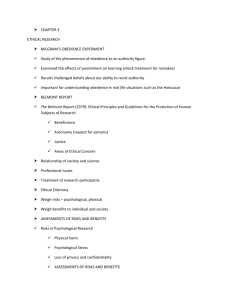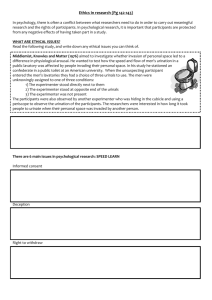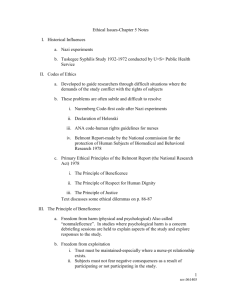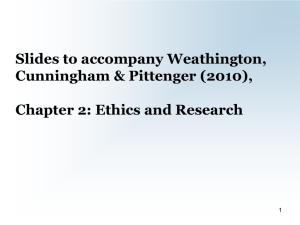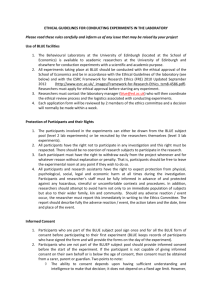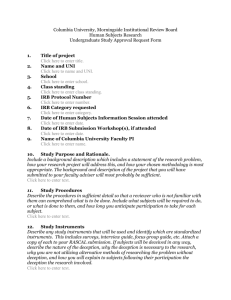Behavioral Research
advertisement
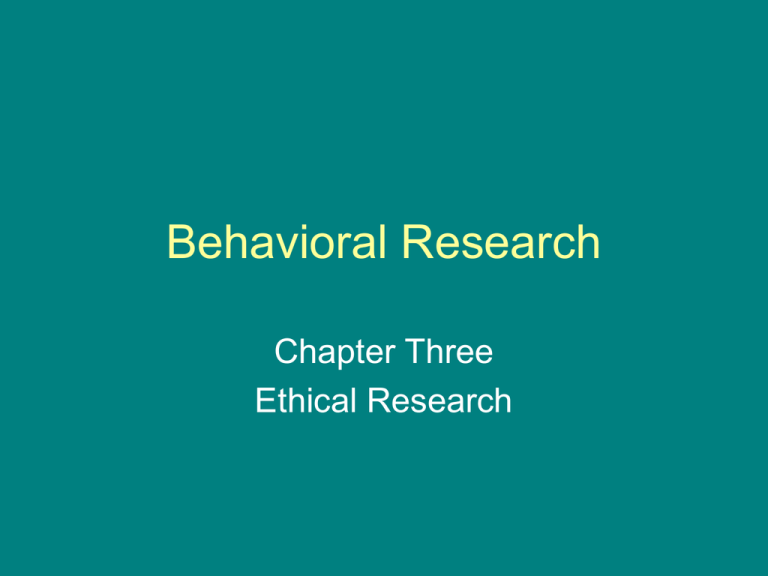
Behavioral Research Chapter Three Ethical Research Why do Ethical issues arise? Behavioral Research Scientists have two sets of obligations that sometimes conflict: • To provide information that enhances our understanding of behavioral processes and lead to improvement of human or animal welfare. • Protect the rights and welfare of the participants of the study. Milgrams Obedience Experiment (1963,1964,1965) Belmont Report: Ethical Guidelines for the Protection of Human Subjects and Research • Instituted in 1979 • Report defined the principles and applications that have guided the APA decisions and the APA Ethics Code. • Three basic Ethical Principals: – Beneficence – Respect for Persons – Justice Current Guidelines for Behavioral Research: • American Psychological Association (APA) ethical code-national governing body for psychologists, provides leadership and sets standards for ethical practice in behavioral research. • Institutional Review Board-all institutions that receive federal funds must have an IRB that reviews research conducted with human participants. American Psychological Association • Three basic ethical principles: – Beneficence-need for research to maximize benefits to minimize any possible harmful effects of participation. Safeguard: Assessment of risks and benefits – Autonomy (respect for persons) Safeguard: Informed Consent – Justice- Bearing the burdens of accepting risk along with benefiting from the research. Safeguard: Selection of Subjects Institutional Review Board • To insure maximum protection for Ps, the members of the IRB must come from a variety of both scientific and nonscientific disciplines. • At least one member of the IRB must be a member of the community who is not associated with the institution in any way • Researchers who use human Ps must submit a written proposal to the IRB describing the purpose and procedures to be used in the experiment and any potential risks to the Ps. Six Main Issues in Ethical Research Practices – Potential Physical or Psychological harm – Lack of Informed Consent – Invasion of privacy – Coercion to participate – Deception – Violation of confidentiality Potential Risks in Psychological Research • Physical Harm • Stress • Psychological Risk minimal risk “risk that is no greater in probability and severity than that ordinarily encountered in daily life or during the performance of routine physical or psychological examinations or test” Potential Benefits • Basic Knowledge • Improvement of Research or Assessment Techniques • Practical Outcomes • Benefits for Researchers • Benefits for Research Participants Principle of Informed Consent • Informed consent involves informing the Ps of the nature of the study and obtaining their explicit agreement to participate. • Obtaining informed consent ensures that researchers do not violate people’s privacy and that prospective research Ps are given enough information about the nature of a study to make a reasoned decision about whether they want to participate Obtaining Informed Consent • Researchers are required to inform Participants about features of the research that might influence their willingness to participate. • If the researcher does not reveal everything at the beginning of the experiment, he/she is obligated to later inform the Ps of all relevant details. • To document that informed consent was obtained, an informed consent form is typically used and signed. Problems with Obtaining Informed Consent • Compromising the Validity of the Study • Participants who are unable to give informed consent Invasion of Privacy • APA has no specific guidelines. • Researchers must make attempts to protect the privacy of participants. • Circumstances and safeguards are decided by the Researcher and the IRB. Coercion to Participate • Coercion to participate when Ps agree to participate b/c of real or implied pressure from some individual who has authority or influence over them. • Ethical guidelines stipulate that the researcher can not “offer excessive or inappropriate financial or other inducements to obtain research participants, particularly when it might tend to coerce participation” • Furthermore, “when research participation is a course requirement or opportunity for extra credit, the prospective participant is given the choice of equitable alternative activities” Deception in Research • Why use deception? – To prevent Ps from learning the true purpose of a study so that their behavior will not be artificially affected. – Types of Deception typically used Objections to Deception – Lying and deceit are immoral and reprehensible acts, even when they are used for good purposes such as research (strictly ethical) – Even if deception can be justified on the grounds that it leads to positive outcomes, it may lead to undesirable consequences (pragmatic) Debriefing A good debriefing accomplishes four goals The debriefing clarifies the nature of the study for Ps. Remove negative consequences that the study may have induced. Obtain Ps/ reactions to the study itself Ps should leave the study felling good about their participation Alternatives to Deception • • • Role-playing Simulation studies Honest experiments Ethical Principles in Research with Animals • Research animals must be monitored by a person who is experienced in the care and use of laboratory animals, and a vet must be available for consultation. • The facilities in which lab animals are housed are closely regulated by the National Institutes of Health (NIH), as well as federal, state, and local laws • The institutions where animal research is done are also monitored by the Institutional Animal Care and Use Committee (IACUC), composed of one scientist, one vet, and a community member • APA guidelines direct researchers to “make reasonable efforts to minimize the discomfort, infection, illness, and pain of animal Ps” • Researcher must justify the use of all procedures that involve more than momentary or slight pain to the animal Risk-benefit analysis • APA regulations also provide guidelines for the use of surgical procedures, the study of animals in field settings, the use of animals for educational (as opposed to research) purposes, and the disposition of animals at the end of a study Scientific Misconduct • • • The most serious and blatant forms of scientific dishonesty, such as fabrication, falsification, and plagiarism. Questionable research practices Unethical behavior that is not unique to scientific investigation,
